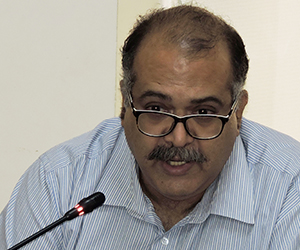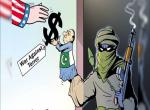Although still not confirmed, US officials appear quite certain that they have managed to ‘take out’ the Taliban mir-ul-Momineen (Leader of the Faithful) in a drone strike carried out in the Balochistan province of Pakistan. If indeed Mullah Akhtar Mansoor has been sent to meet his Maker (surely not a very pleasing prospect for the latter) then the implications of this development are quite significant. Besides the fact that this would have been the first time that the drones have struck at a target outside of the narrow box of the Tribal Areas, and on a few occasions, the Frontier Regions (the belt between the settled districts of Khyber Pakhtunkhwa and FATA), it is the impact of this development on relations between the US and Pakistan, between Afghanistan and Pakistan, between the Taliban and Pakistan, and of course, the internal dynamics within the Taliban, that will determine the future course of events in the AfPak region.
There are broadly two possibilities about how Mansoor got hit. The first is that the Pakistanis received a sucker punch from the Americans who were no longer willing to put up with Pakistan's double-games. The Americans got information on Mansoor and, without bothering about diplomatic niceties or Pakistani sensitivities, and even less about the consequences, took the shot; the second is that that the Pakistanis were in the loop, and perhaps even more sinisterly, that they set up the loop, to get rid of the Taliban chief who was becoming a tad too inconvenient, and worse, a little too independent. Whatever be the case, Mansoor’s death will certainly provide some openings, even breaches, which if exploited properly and effectively, could turn the tide of the war in Afghanistan in favour of the Afghan state and against the Islamists.
Assuming that the Pakistanis were blindsided in Mansoor’s killing, it will cause deep embarrassment to the ‘Guardians of Pakistan's geographic and ideological frontiers’ who after the Abbottabad operation to kill Osama bin Laden were once again caught off-guard by US drones flying over Balochistan. The impact of this will be felt on the relations between Pakistan and the US, which are likely to go into a tailspin. Worse, it will mean that an unravelling of Pakistan's grand strategic plan for Afghanistan on which it has staked so much and sacrificed so much.
The second possibility is that Pakistan was very much in on Mansoor’s killing. The Pakistanis will, of course, not only go blue in the face denying that they had anything to do with the drone strike, but will also condemn it and lodge a strong protest for good measure. But such treachery, even though it exposes the embarrassing reality of the Taliban chief’s presence inside Pakistan (something that the Pakistanis had been vehemently denying partly to give Mansoor legitimacy and partly to tell the world that he wasn’t their puppet), isn’t past the Pakistanis. Over the past few months, relations with the US have once again started going downhill. The aid cut and the withdrawal of subsidy on eight F-16 fighters was only one manifestation of the trajectory in which the relationship was moving. The Afghan government was meanwhile bristling at what it described as perfidy of Pakistan which reneged on pledges made when the Quadilateral Coordination Group (QCG) was set up.
The failure of the much vaunted QCG (which included China) to push the peace process forward meant that diplomatic efforts to settle Afghanistan had reached a dead-end, which in turn meant that the violence would intensify and could spill over into Pakistan. With the security situation in Pakistan deteriorating, the ambitious China-Pakistan Economic Corridor (CPEC) on which Pakistan has staked its entire future, would be adversely affected. There are reasons to believe that even the Chinese were leaning on the Pakistanis to start delivering on Afghanistan. Just a couple of days back, the Pakistani army chief had visited China to discuss the regional security situation as well as the security of CPEC projects. Add to this the visit of the Indian Prime Minister, first to Iran to firm up the Chabahar project, and later to the US, and it’s clear that the Pakistanis needed to rethink their Afghan gambit.
By helping the Americans take out Mansoor, the Pakistanis would have delivered a big prize to the Americans. It would also help them reach out to the Afghans to convince them that they aren’t going to back the Taliban blindly. But here is the thing: Mansoor was expendable for Pakistan simply because his loss doesn’t necessarily mean the loss of control over the Taliban! Over the past few months, the Pakistanis had not only managed to snuff out challenges to Mansoor from within Taliban ranks, but had also got a firm control over the movement by making Sirajuddin Haqqani the lynchpin of the Taliban. With Mansoor dead, the Pakistanis will try to get their man, Sirajuddin, in the driving seat and perhaps even get him to be accepted as Emir-ul-Momineen of the Taliban. To be sure, many Taliban commanders will not accept him as Emir. But given the firepower of the Haqqanis, coupled with efforts of the Afghan Army and the Americans, these elements can be put out of business. And once this is done, the ‘reconciliation’ drama can recommence with the Pakistanis and their proxies plugging for their demands (including marginalisation of India) to be accepted.
While the Pakistani's might have played a calculated, if also high risk, gamble, Afghanistan has a bad habit of pulling rude surprises on even carefully calculated and calibrated plans. There is a lot that could go out of control in Afghanistan which will inevitably spill over into Pakistan, not the least of which is a Taliban blowback. Even if the Taliban were to accept Sirajuddin as their overlord, will Sirajuddin continue to play ball with the Pakistanis, and more importantly with the Americans and the Afghan government, once he gets to lord over the Taliban? How will that dynamic play out? Won’t Sirajuddin or any other successor of Mansoor (even if it is Mullah Omar’s son) have to establish his jihadi credentials just as Mansoor had to by unleashing a wave of violence in Afghanistan? If so, then clearly the situation will get much worse before it gets better, if at all. Which in turn means that Mansoor’s death wouldn’t have really changed anything. Of course if there is another power struggle within the Taliban ranks then it will open an opportunity for the Afghan government to woo some and kill some Taliban and generally degrade the movement. But even if this were to happen, it would mean an escalation in violence in the coming days.
While it is good riddance to Mansoor, his death isn’t going to change the ground situation in Afghanistan for the better, at least not immediately. It will also not pave the path for any immediate political reconciliation in Afghanistan and could in fact make the battle-lines somewhat more chaotic. Even so, the Americans have delivered a good, solid blow, and that needs to be welcomed. In anything, more such blows need to be delivered to make the Taliban and their affiliates amenable to a political settlement in Afghanistan.
Published Date: 22th May 2016, Image Source:http://www.en.wikipedia.org
(Disclaimer: The views and opinions expressed in this article are those of the author and do not necessarily reflect the official policy or position of the Vivekananda International Foundation)











Post new comment